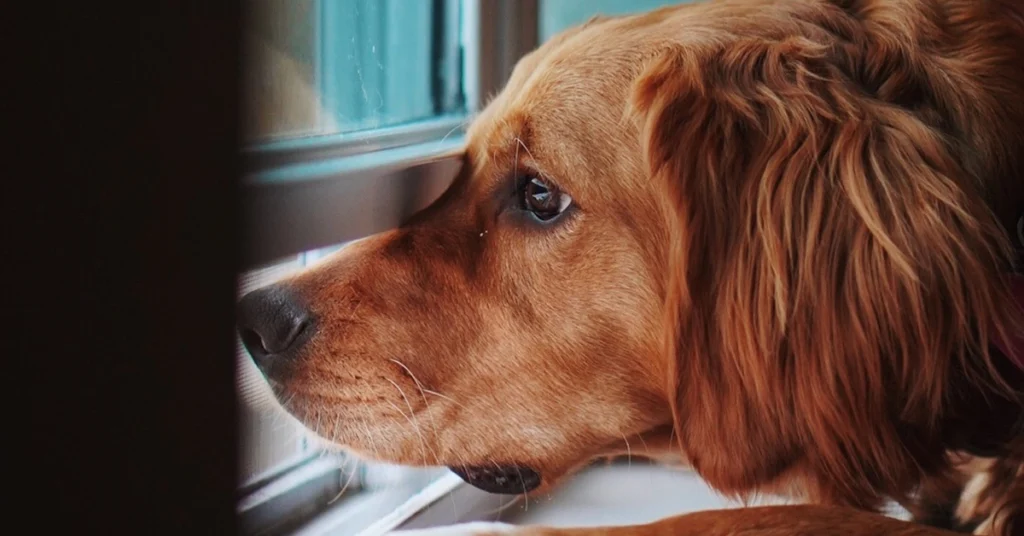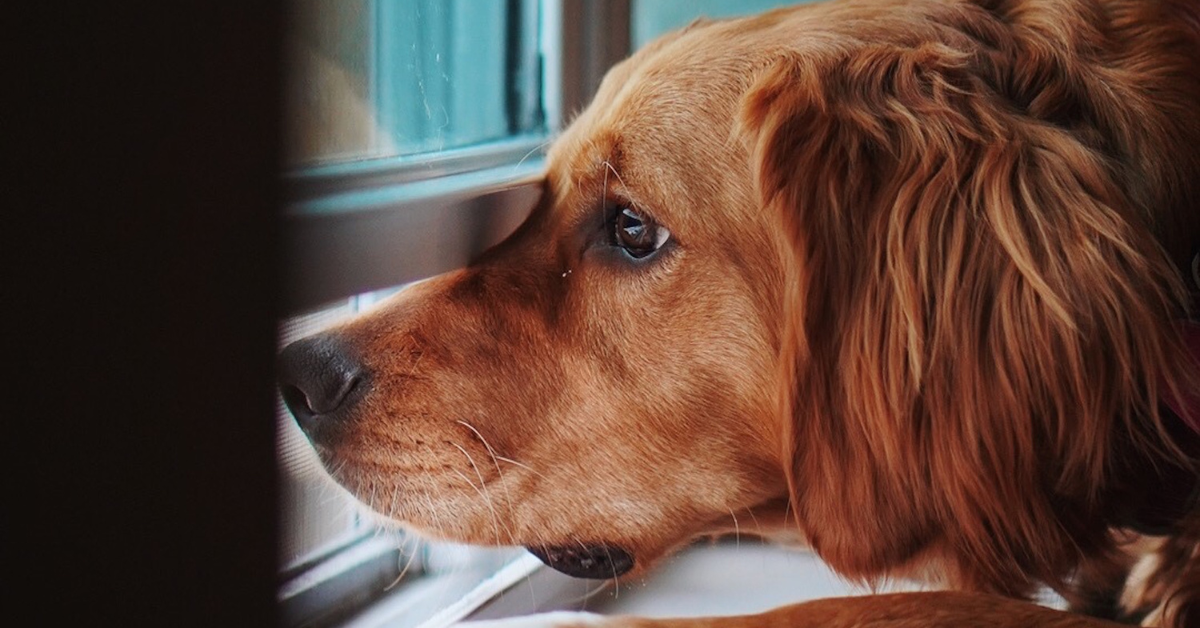Yelling at your dog when frustrated may seem like a natural response, but have you noticed that your dog leaves the room when this happens? Some of our clients said that my dog leaves the room when I go to bed, this is weird. Actually, dogs are susceptible to their environment and how we communicate with them.
Understanding why your dog reacts this way can help strengthen your bond and avoid unnecessary stress. In this informative and trustable, “The Pet Guidance” platform we will explore why dogs leave the room when you yell, how it impacts them emotionally, and what alternatives you can try.
Contents
- 1 Why Does My Dog Leave The Room When I Yell?
- 2 Signs My Dog Is Scared Of Yelling
- 3 How Does Yelling Affect My Dog’s Behavior?
- 4 What Should I Do If My Dog Is Scared Of Loud Noises?
- 5 Best Way To Train A Dog Without Yelling
- 6 How Can I Reverse My Dog’s Fearful Behavior After Yelling At It For Chewing Something?
- 7 Do Dogs Experience Stress And Anxiety When People In That House Always Yell And Scream At Each Other?
- 8 People’s Queries
- 8.1 Why Does My Dog Leave The Room When I Go To Bed?
- 8.2 Do Dogs Easily Forgive After Being Yelled At?
- 8.3 Why Does My Dog Hide And Ignore Me When I Call His Name?
- 8.4 Why Does My Dog Try To Snuggle With Me When I Get Angry Or Yell At People?
- 8.5 Why Does My Dog Leave The Room Every Time My Girlfriend Enters?
Why Does My Dog Leave The Room When I Yell?
Dogs may leave the room when you yell because they are sensitive to loud noises and negative energy that cause fear, anxiety or stress, anger, and disobedience. They try to seek a safe and quiet place. Dogs may also associate loud noises with punishment or negative experiences. By removing themselves from the situation, they are trying to avoid conflict or discomfort, which can affect their emotional well-being and the bond they share.

Signs My Dog Is Scared Of Yelling
Your dog shows some signs that he is scared of you yelling at him.
Tucked Tail
This is one of the most common signs of fear when your dog tucks his tail between his legs. This shows submission and nervousness.
Cowering And Hiding
Your dog may try to curl up in a corner, hide under furniture, or lower their body posture when they hear yelling. This is their way of avoiding the source of fear.
Shaking Or Trembling
Fear can cause physical reactions, such as trembling, shaking, or even trembling, especially if your dog is highly sensitive to loud noises.
Excessive Panting
If your dog starts panting loudly without being physically active, this could be a sign of anxiety or stress caused by yelling.
Avoiding Eye Contact
Fearful dogs will often avoid eye contact and turn their heads away, showing that they don’t want to face the source of their fear.
If you notice these signs, try to create a calm and reassuring environment, and pat your dog’s head to help your dog feel safe.
How Does Yelling Affect My Dog’s Behavior?
As I told you above, yelling can have a negative impact on your dog’s behavior, causing fear, anxiety, and confusion. Dogs don’t understand the concept of yelling as humans do, and it often makes them feel unsafe.
Over time, this can lead to behavioral problems like avoidance, increased aggression, or withdrawal.
Excessive yelling can also damage the bond of trust between you and your dog, making it difficult to train them effectively. Positive reinforcement is a much better method for guiding your dog’s behavior.
What Should I Do If My Dog Is Scared Of Loud Noises?
If your dog is scared of loud noises then you can follow these steps –
Create A Safe Space
Provide your dog with a quiet, comfortable place where he can feel relaxed, such as a specific room that plays soothing sounds like soft music.
Stay Calm And Reassuring
Comfort your dog with loving caresses and a calm voice, but avoid increasing his fear by overreacting.
Use Distractions
Engage your dog in activities it enjoys, such as playing with toys or feeding it something, to distract it from the noise.
Gradual Desensitization
Slowly expose your dog to the sound in controlled environments, rewarding calm behavior to reduce their fear over time.
Consider Calming Aids
Calming vests, pheromone sprays, or veterinarian-prescribed anxiety medications can help reduce your dog’s stress during noisy situations.
Best Way To Train A Dog Without Yelling
Knowing the best approach to correct my dog’s behavior without yelling is good to make your dog feel safe.
Reward Good Behavior
When your dog follows commands or performs a desired behavior, reward him with treats, praise, or toys. This encourages him to repeat the behavior.
Use Clear Commands
Giving a clear command to the dog is crucial otherwise the dog acts afraid when disobeying because he feels confused about what is right or wrong. Speak in a calm voice, and firm tone while giving simple, consistent commands.
Redirect Undesirable Behaviors
Instead of yelling, gently direct your dog’s attention to an appropriate activity or command, such as sitting or playing with a toy.
Be Patient And Consistent
Training takes time, so practice patience and be consistent with rewards and commands to build a strong understanding.
Clicker Training
Using a clicker can signal correct behavior, followed by a treat, reinforcing learning without the need to raise your voice.
How Can I Reverse My Dog’s Fearful Behavior After Yelling At It For Chewing Something?
To reverse your dog’s fearful behavior after yelling, start by rebuilding trust through positive interactions. Offer Gentle reassurance, use a calm voice, and reward him with treats and praise for good behavior. Create a consistent, positive environment to help your dog feel safe.
Change their chewing habit by providing appropriate toys and avoiding punishment in the future. Patience and time will help your dog overcome fear, as well as strengthen the bond through kindness and understanding.
Check Out – How comes dogs fart but no sound?
Do Dogs Experience Stress And Anxiety When People In That House Always Yell And Scream At Each Other?
Yes, constant yelling can cause dogs to experience stress and anxiety. Loud arguments create a chaotic and turbulent environment, which makes dogs feel insecure.
This stress can lead to behavioral problems such as hiding, trembling, aggression, or even physical symptoms such as excessive panting, or digestive problems. A calm and peaceful home helps dogs feel secure, boosting their emotional well-being.
Check Out – 25 vet-approved homemade dog food recipes for specific health problems
People’s Queries
Why Does My Dog Leave The Room When I Go To Bed?
Your dog may leave the room when you go to sleep because he prefers a cooler or more comfortable spot, wants space, or is following his natural routine.
Do Dogs Easily Forgive After Being Yelled At?
Yes, dogs generally forgive quickly after being yelled at, repeated yelling can affect their trust and emotional well-being.
Why Does My Dog Hide And Ignore Me When I Call His Name?
Your dog may hide and ignore you if they feel scared, anxious, or have associated their name with negative experiences like punishment.
Why Does My Dog Try To Snuggle With Me When I Get Angry Or Yell At People?
Your dog tries to snuggle with you when you’re angry to comfort you and see tension, sensing your distress through their natural empathy and desire to calm the situation.
Why Does My Dog Leave The Room Every Time My Girlfriend Enters?
Your dog may leave the room when your girlfriend enters due to feelings anxious, uncertain, or needing time to adjust to her presence.

I’m Dr. Evan Antin, an animal expert and exotic animal veterinarian with a passion for helping pets and their owners thrive. With years of experience working with animals of all kinds, I bring a unique perspective to dog training, offering personalized in-home training sessions that cater to your dog’s specific needs. My goal is to create a strong bond between you and your pet through effective, compassionate techniques. Whether you’re dealing with behavioral issues or simply want to strengthen your dog’s skills, I’m here to help you achieve lasting, positive results.

